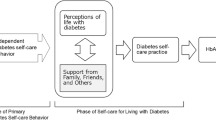Abstract
Effective family management of type 1 diabetes in childhood is critical to maintaining optimal glycemic control. The purpose of this study was to provide preliminary evidence for a reduced form of the Diabetes Self-Management Profile (DSMP) using Rasch modeling techniques. The study was a secondary analysis of DSMP data drawn from a previous study on patterns of self-management from 239 preadolescents with type 1 diabetes. Rasch modeling strategies were used to identify the most informative items and then a reduced score composite was correlated with hemoglobin A1c (A1c) and blood glucose monitoring (BGM) frequency. A short form of the DSMP was obtained using seven items that comprised all five subscales of the DSMP. The DSMP Short-Form (DSMP-SF) composite score correlated significantly with child’s HbA1c and BGM frequency. The DSMP-SF may be considered a valid and effective screening interview alternative to the longer, original, DSMP, particularly when attempting to identify high-risk patients.
Similar content being viewed by others
References
Danne, T., Mortensen, H. B., Hougaard, P., Lynggaard, H., Aanstoot, H., Chiarelli, F., et al. (2001). Persistent differences among centers over 3 years in glycemic control and hypoglycemia in a study of 3,805 children and adolescents with type 1 diabetes from the Hvidøre Study Group. Diabetes Care, 24, 1342–1347.
DirectNet Study Group. (2005). Diabetes Self Management Profile for flexible insulin regimens: Cross-sectional and longitudinal analysis of psychometric properties in a pediatric sample. Diabetes Care, 28, 2034–2035.
Harris, M. A., Wysocki, T., Buckloh, L. M., White, N. H., Sadler, M., & Wilkinson, K. (2002). Psychometric properties of the Diabetes Self-Management Profile: Longitudinal analysis. Diabetes, 51, 1826.
Harris, M. A., Wysocki, T., Sadler, M., Wilkinson, K., Harvey, L. M., Buckloh, L. M., et al. (2000). Validation of a structured interview for the assessment of diabetes self-management. Diabetes Care, 23, 1301–1304.
Hood, K. K., Peterson, C. M., Rohan, J. M., & Drotar, D. (2009). Association between adherence and glycemic control in pediatric type 1 diabetes: A meta-analysis. Pediatrics, 124, e1171–e1179.
Johnson, S. B., Kelly, M., Henretta, J. C., Cunningham, W., Tomer, A., & Silverstein, J. (1992). A longitudinal analysis of adherence and health status in childhood diabetes. Journal of Pediatric Psychology, 17, 537–553.
Lewin, A. B., Heidgerken, A. D., Geffken, G. R., Williams, L. B., Storche, E. A., Gelfand, K. M., et al. (2006). The relation between family factors and metabolic control: The role of diabetes adherence. Journal of Pediatric Psychology, 31, 174–183.
Lewin, A. B., LaGreca, A. M., Geffken, G. R., Williams, L. B., Duke, D. C., Storch, E. A., et al. (2009). Validity and reliability of an adolescent and parent rating scale of type 1 diabetes adherence behaviors: The Self-Care Inventory (SCI). Journal of Pediatric Psychology, 34, 1999–2007.
Lewin, A. B., Storch, E. A., Geffken, G. R., Heidgerken, A. D., Williams, L. B., & Silverstein, J. H. (2005). Further examination of a structured adherence interview of diabetes for children, adolescents, and parents. Child Health Care, 34, 149–164.
Markowitz, J. T., Laffel, L. M. B., Volkening, L. K., Anderson, B. J., Nansel, T. R., Weissberg-Benchell, J., et al. (2011). Validation of an abbreviated adherence measure for young people with type 1 diabetes. Diabetic Medicine, 28, 1113–1117.
McNally, K., Rohan, J., Pendley, J. S., Delamater, A., & Drotar, D. (2010). Executive functioning, treatment adherence, and glycemic control in children with type 1 diabetes. Diabetes Care, 33, 1159–1162.
Quittner, A. L., Modi, A. C., Lemanek, K. L., Ievers-Landis, C. E., & Rapoff, M. A. (2008). Evidence-based assessment of adherence to medical treatments in pediatric psychology. Journal of Pediatric Psychology, 33, 916–936.
Silverstein, J., Klingensmith, G., Copeland, K., Plotnick, L., Kaufman, F., Laffel, L., et al. (2005). Care of children and adolescents with type 1 diabetes: A statement of the American Diabetes Association. Diabetes Care, 28, 186–212.
Smith, R. M. (2004). Fit analysis in latent trait measurement models. In E. V. Smith & R. M. Smith (Eds.), Introduction to Rasch measurement: Theory, models and applications (pp. 73–92). Maple Grove: JAM Press.
Wolfe, E. W., & Smith, E. V. (2007). Instrument development tools and activities for measure validation using Rasch models: Part I-Instrument development tools. In E. V. Smith & R. M. Smith (Eds.), Rasch measurement: Advanced and specialized applications (pp. 202–242). Maple Grove: JAM Press.
Wright, B. D., & Masters, G. (1982). Rating scale analysis. Chicago: Mesa Press.
Wright, B. D., & Mok, M. M. (2004). An overview of the family of Rasch measurement models. In E. V. Smith & R. M. Smith (Eds.), Introduction to Rasch measurement: Theory, models and applications (pp. 1–24). Maple Grove: JAM Press.
Wysocki, T., Harris, M. A., Wilkinson, K., Sadler, M., Mauras, N., & White, N. H. (2003). Self-management competence as a predictor of outcomes of intensive therapy or usual care in youth with type 1 diabetes. Diabetes Care, 26, 2043–2047.
Acknowledgments
Funding for this research was made possible through a grant from the National Institutes of Health (Grant No. R01DK069486).
Conflict of interest
No particular conflicts of interest relevant to this article were reported.
Author information
Authors and Affiliations
Corresponding author
Rights and permissions
About this article
Cite this article
Ittenbach, R.F., Cassedy, A.E., Rohan, J.M. et al. Diabetes Self-Management Profile Short Form: A Preliminary Report. J Clin Psychol Med Settings 20, 107–113 (2013). https://doi.org/10.1007/s10880-012-9310-7
Published:
Issue Date:
DOI: https://doi.org/10.1007/s10880-012-9310-7




